Global Hypersonic Flight Market, By Type, By Component, By End Use, By Region & Segmental Insights Trends and Forecast, 2024 – 2034
- Industry: Aerospace & Defense
- Report ID: TNR-110-1331
- Number of Pages: 420
- Table/Charts : Yes
- October, 2024
- Base Year : 2024
- No. of Companies : 10+
- No. of Countries : 29
- Views : 10034
- Covid Impact Covered: Yes
- War Impact Covered: Yes
- Formats : PDF, Excel, PPT
Hypersonic flight refers to speeds exceeding Mach 5, or five times the speed of sound (approximately 6,174 km/h at sea level). This ultra-high velocity enables significantly faster travel times compared to supersonic and subsonic speeds. The hypersonic flight market is rapidly evolving with applications spanning military, space exploration, and commercial sectors. In military applications, hypersonic weapons like the Russian Avangard missile (deployed in 2019) and the US Air Force’s X-51 Waverider (tested in 2013) demonstrate the potential for rapid, unpredictable strike capabilities. Space agencies are also exploring hypersonic technology for reusable spacecraft, exemplified by SpaceX’s Starship (first orbital flight attempt in 2022), aiming to revolutionize satellite deployment and interplanetary travel.
Commercially, hypersonic flight promises to reduce intercontinental travel times drastically. Companies like Boom Supersonic, targeting a 2026 rollout of the Overture airliner, aim to cut travel times between New York and London to just 3.5 hours, transforming global transportation efficiency and connectivity. The benefits include reduced travel fatigue, increased operational efficiency, and expanded opportunities for global commerce and tourism. “In Terms of Revenue, the Global Hypersonic Flight Market was Worth US$ 742.5 Mn in 2023, Anticipated to Witness CAGR of 6.6% During 2024 – 2034.”
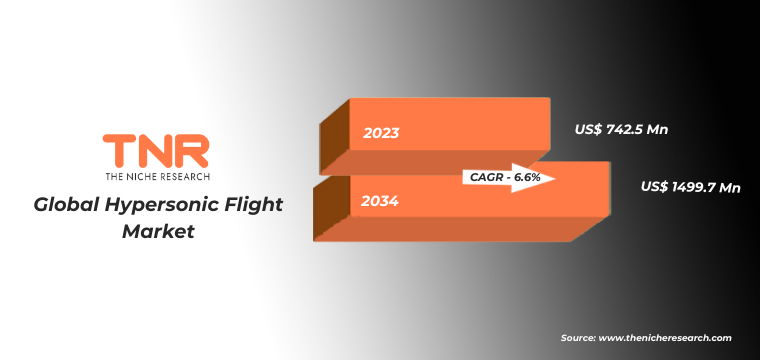
Global Hypersonic Flight Market Hypersonic Spendings:
In 2023, U.S. hypersonic spending saw substantial investments from both the Air Force and Army. The Air Force allocated significant funds to develop the AGM-183A Air-Launched Rapid Response Weapon (ARRW), with a $1.4 billion budget increase in 2023 for advanced testing and deployment.
The Army also boosted spending on hypersonic programs, particularly the Long-Range Hypersonic Weapon (LRHW), set to enter service by 2024. In 2021, the Army successfully tested its hypersonic glide body as part of a $3.8 billion multi-year project. These investments reflect growing demand for cutting-edge hypersonic technologies across both branches, aiming to enhance national defense capabilities.
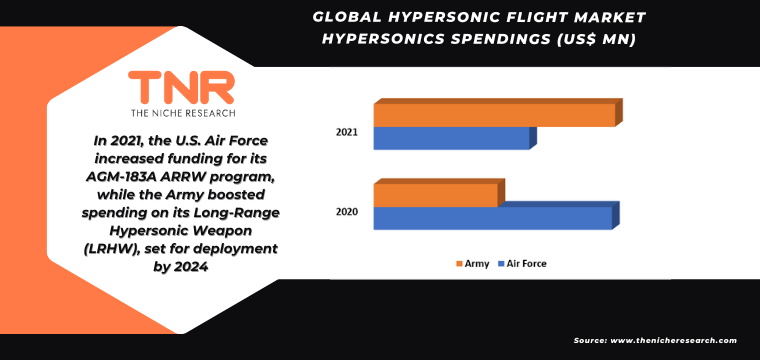
Opportunities in the Global Hypersonic Flight Market
- Advancements in Military Applications: The global hypersonic flight market offers immense opportunities in military applications due to the increasing demand for advanced defense systems. Hypersonic missiles, like Russia’s Avangard (deployed in 2019) and China’s DF-ZF glide vehicle (operational since 2020), provide unmatched speed and maneuverability, making them difficult to detect and intercept. In 2023, the U.S. Department of Defense ramped up its development of hypersonic technologies, including the AGM-183A Air-launched Rapid Response Weapon (ARRW). These advancements are driving investments in counter-hypersonic systems, fostering opportunities for defense contractors and technology firms. The rise of geopolitical tensions has further accelerated this trend, leading countries to prioritize hypersonic weaponry to strengthen their deterrence capabilities, creating a robust and evolving market for hypersonic flight in defense.
- Revolutionizing Commercial Air Travel: Hypersonic flight holds transformative potential in the commercial aviation industry by drastically reducing travel times. Startups like Hermeus are pioneering hypersonic passenger aircraft, with plans to fly their first prototype by 2029. In 2022, Boom Supersonic, while focused on supersonic flight, hinted at future hypersonic ventures, aiming to cut intercontinental travel times to a fraction. Hypersonic technology could enable flights from New York to Tokyo in just two hours. NASA’s partnership with private firms, including the development of the X-59 QueSST (expected flight tests in 2024), further emphasizes interest in ultra-fast travel. As the technology matures, airlines may capitalize on high-speed travel demand, catering to time-sensitive industries like business travel and medical emergencies, thus unlocking new revenue streams.
Global Hypersonic Flight Market Segmental Analysis:
Hypersonic aircraft by type category have emerged as a dominant segment in the global hypersonic flight market capturing a revenue share of 67.3% in 2023. This dominance is driven by significant advancements in both military and commercial aviation. For example, DARPA’s Falcon Hypersonic Test Vehicle 2 (HTV-2), tested in 2011, laid the groundwork for future developments. In 2020, the U.S. Air Force accelerated the testing of its X-51A Waverider, demonstrating speeds over Mach 5. Commercially, Hermeus aims to launch its hypersonic passenger aircraft by 2029, offering game-changing travel solutions. These developments showcase the increasing demand for ultra-fast aircraft across defense and civilian sectors, further boosting the market’s growth.
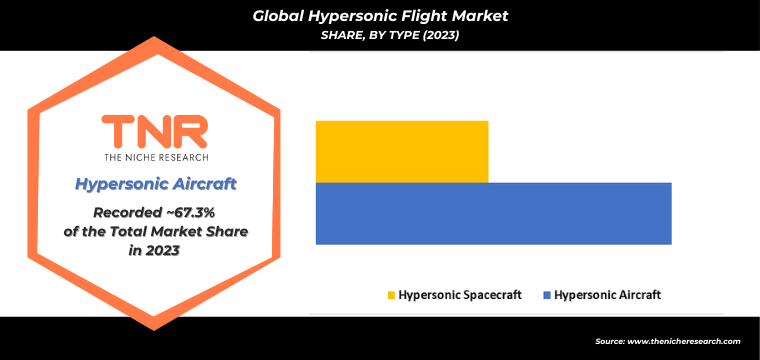
In 2023, avionics segment solidified its position as the second-largest leading component category within the global hypersonic flight market in 2023, with a revenue share of 28.7%. Advanced avionics systems are critical for navigation, communication, and control in hypersonic vehicles. For example, Lockheed Martin’s SR-72, set to launch by the mid-2020s, is equipped with sophisticated avionics to manage its Mach 6 speed. Similarly, NASA’s X-43A, which set a Mach 9.6 record in 2004, relied on cutting-edge avionics for stability and data transmission. As hypersonic technology advances, the demand for robust, high-precision avionics systems continues to grow, supporting the segment’s rise.
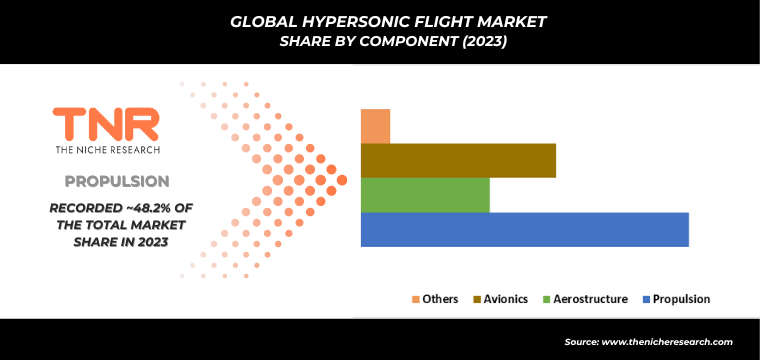
By end use, space agencies segment is anticipated to grow fastest over the forecast timeline in global hypersonic flight market, capturing a revenue share of 32.5% in 2023. Space agencies like NASA and ESA are heavily investing in hypersonic technologies for future missions. NASA’s X-59 QueSST, set for testing in 2024, aims to achieve quieter supersonic and hypersonic flight, advancing aerospace research. In 2022, the European Space Agency (ESA) also invested in hypersonic systems for space travel and satellite deployment. These technologies are crucial for faster spacecraft re-entry and long-distance space exploration, making the space agencies segment a key driver of market growth.

In 2023, North America solidified its dominance in the global hypersonic flight market, contributing a revenue share of 33.7%. This leadership is driven by substantial investments in hypersonic research and development by U.S. defense agencies and aerospace companies. The U.S. Department of Defense continues to advance hypersonic missile systems, such as the AGM-183A ARRW, tested in 2023. Companies like Lockheed Martin and Raytheon are key players, with Lockheed’s SR-72 hypersonic aircraft expected to debut by the mid-2020s. Additionally, NASA’s ongoing projects, including the X-43A and X-59 QueSST, demonstrate North America’s commitment to advancing hypersonic technologies, solidifying its global market dominance.
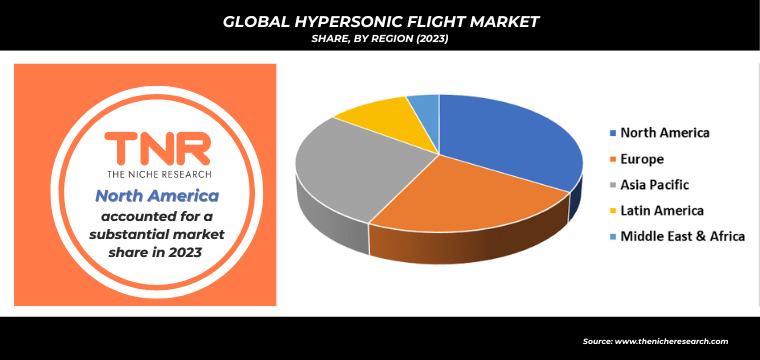
Competitive Landscape
Some of the players operating in the hypersonic flight market are
- BAE Systems plc
- Boeing Company
- Destinus
- General Atomics
- Hermeus Corporation
- Lockheed Martin Corporation
- Nevada Corporation
- Northrop Grumman Corporation
- Raytheon Technologies Corporation
- Thales Group
- Venus Aerospace
- Other Industry Participants
Global Hypersonic Flight Market Scope:
| Report Specifications | Details |
| Market Revenue in 2023 | US$ 742.5 Mn |
| Market Size Forecast by 2034 | US$ 1499.7 Mn |
| Growth Rate (CAGR) | 6.6% |
| Historic Data | 2016 – 2022 |
| Base Year for Estimation | 2023 |
| Forecast Period | 2024 – 2034 |
| Report Inclusions | Market Size & Estimates, Market Dynamics, Competitive Scenario, Trends, Growth Factors, Market Determinants, Key Investment Segmentation, Product/Service/Solutions Benchmarking |
| Segments Covered | By Type, By Component, By End Use, By Region |
| Regions Covered | North America, Europe, Asia Pacific, Middle East & Africa, Latin America |
| Countries Covered | U.S., Canada, Mexico, Rest of North America, France, The UK, Spain, Germany, Italy, Nordic Countries (Denmark, Finland, Iceland, Sweden, Norway), Benelux Union (Belgium, The Netherlands, Luxembourg), Rest of Europe, China, Japan, India, New Zealand, Australia, South Korea, Southeast Asia (Indonesia, Thailand, Malaysia, Singapore, Rest of Southeast Asia), Rest of Asia Pacific, Saudi Arabia, UAE, Egypt, Kuwait, South Africa, Rest of Middle East & Africa, Brazil, Argentina, Rest of Latin America |
| Key Players | BAE Systems plc, Boeing Company, Destinus, General Atomics, Hermeus Corporation, Lockheed Martin Corporation, Nevada Corporation, Northrop Grumman Corporation, Raytheon Technologies Corporation, Thales Group, Venus Aerospace |
| Customization Scope | Customization allows for the inclusion/modification of content pertaining to geographical regions, countries, and specific market segments. |
| Pricing & Procurement Options | Explore purchase options tailored to your specific research requirements |
| Contact Details | Consult With Our Expert
Japan (Toll-Free): +81 663-386-8111 South Korea (Toll-Free): +82-808- 703-126 Saudi Arabia (Toll-Free): +966 800-850-1643 United Kingdom: +44 753-710-5080 United States: +1 302-232-5106 E-mail: askanexpert@thenicheresearch.com
|
Global Hypersonic Flight Market
By Type
- Hypersonic Aircraft
- Military Jet
- Commercial Plane
- Hypersonic Spacecraft
- Spaceplane
- Airbreathing Hypersonic Vehicle
- Hypersonic Testbed & Demonstrator
By Component
- Propulsion
- Scramjet Engine
- Ramjet Engine
- Rocket Engine
- Hybrid Engine
- Aerostructure
- Airframe Structure
- Wing and control surface
- Nose cone and leading edge
- Avionics
- Flight control system
- Navigation System
- Communication system
- Others
By End Use
- Space Agencies
- Military and Defense
- Commercial
By Region
- North America (U.S., Canada, Mexico, Rest of North America)
- Europe (France, The UK, Spain, Germany, Italy, Nordic Countries (Denmark, Finland, Iceland, Sweden, Norway), Benelux Union (Belgium, The Netherlands, Luxembourg), Rest of Europe)
- Asia Pacific (China, Japan, India, New Zealand, Australia, South Korea, Southeast Asia (Indonesia, Thailand, Malaysia, Singapore, Rest of Southeast Asia), Rest of Asia Pacific)
- Middle East & Africa (Saudi Arabia, UAE, Egypt, Kuwait, South Africa, Rest of Middle East & Africa)
- Latin America (Brazil, Argentina, Rest of Latin America)
Report Layout:
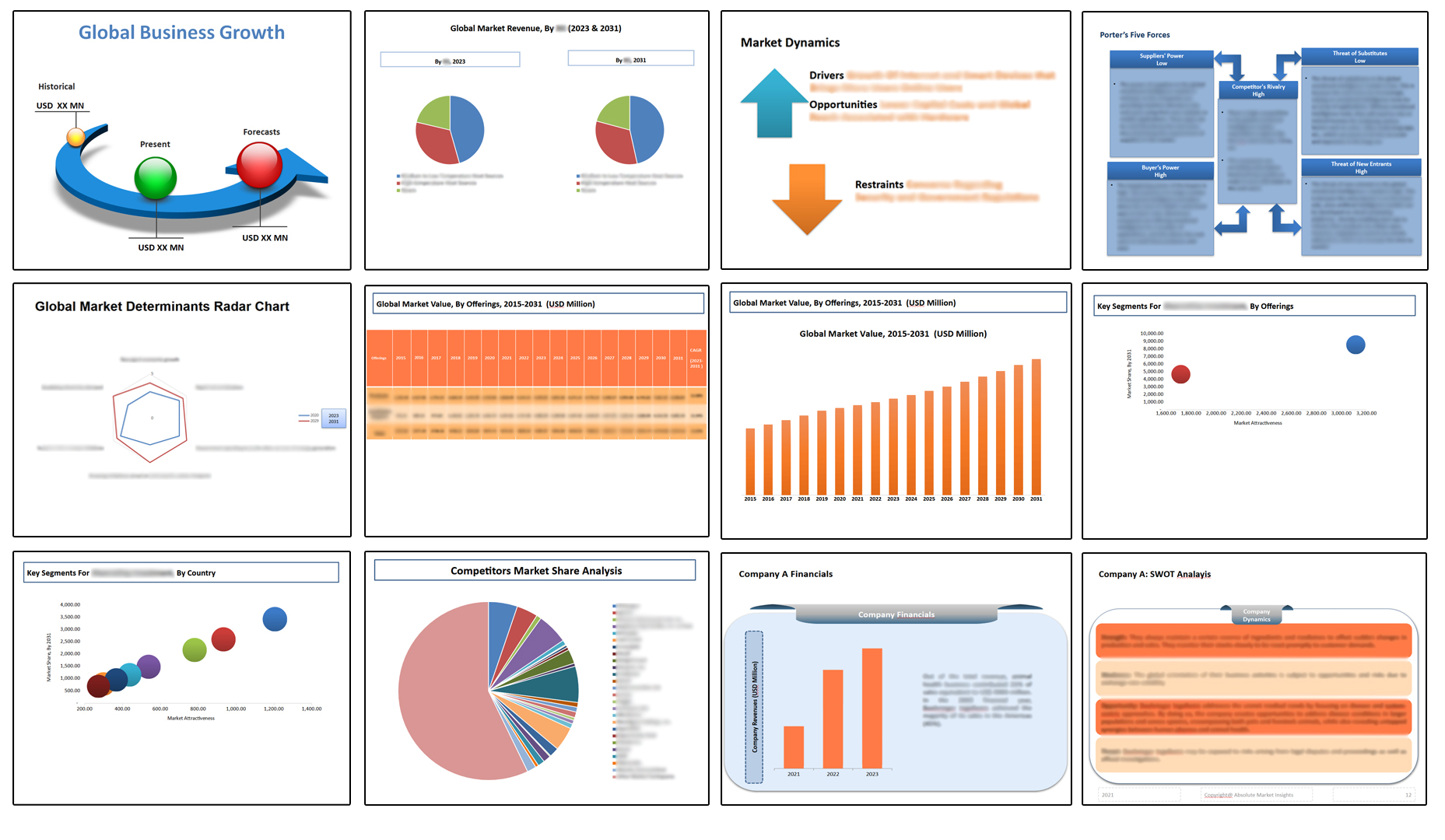
Table of Contents
Note: This ToC is tentative and can be changed according to the research study conducted during the course of report completion.
**Exclusive for Multi-User and Enterprise User.
Global Hypersonic Flight Market
By Type
- Hypersonic Aircraft
- Military Jet
- Commercial Plane
- Hypersonic Spacecraft
- Spaceplane
- Airbreathing Hypersonic Vehicle
- Hypersonic Testbed & Demonstrator
By Component
- Propulsion
- Scramjet Engine
- Ramjet Engine
- Rocket Engine
- Hybrid Engine
- Aerostructure
- Airframe Structure
- Wing and control surface
- Nose cone and leading edge
- Avionics
- Flight control system
- Navigation System
- Communication system
- Others
By End Use
- Space Agencies
- Military and Defense
- Commercial
By Region
- North America (U.S., Canada, Mexico, Rest of North America)
- Europe (France, The UK, Spain, Germany, Italy, Nordic Countries (Denmark, Finland, Iceland, Sweden, Norway), Benelux Union (Belgium, The Netherlands, Luxembourg), Rest of Europe)
- Asia Pacific (China, Japan, India, New Zealand, Australia, South Korea, Southeast Asia (Indonesia, Thailand, Malaysia, Singapore, Rest of Southeast Asia), Rest of Asia Pacific)
- Middle East & Africa (Saudi Arabia, UAE, Egypt, Kuwait, South Africa, Rest of Middle East & Africa)
- Latin America (Brazil, Argentina, Rest of Latin America)
The Niche Research approach encompasses both primary and secondary research methods to provide comprehensive insights. While primary research is the cornerstone of our studies, we also incorporate secondary research sources such as company annual reports, premium industry databases, press releases, industry journals, and white papers.
Within our primary research, we actively engage with various industry stakeholders, conducting paid interviews and surveys. Our meticulous analysis extends to every market participant in major countries, allowing us to thoroughly examine their portfolios, calculate market shares, and segment revenues.
Our data collection primarily focuses on individual countries within our research scope, enabling us to estimate regional market sizes. Typically, we employ a bottom-up approach, meticulously tracking trends in different countries. We analyze growth drivers, constraints, technological innovations, and opportunities for each country, ultimately arriving at regional figures.Our process begins by examining the growth prospects of each country. Building upon these insights, we project growth and trends for the entire region. Finally, we utilize our proprietary model to refine estimations and forecasts.
Our data validation standards are integral to ensuring the reliability and accuracy of our research findings. Here’s a breakdown of our data validation processes and the stakeholders we engage with during our primary research:
- Supply Side Analysis: We initiate a supply side analysis by directly contacting market participants, through telephonic interviews and questionnaires containing both open-ended and close-ended questions. We gather information on their portfolios, segment revenues, developments, and growth strategies.
- Demand Side Analysis: To gain insights into adoption trends and consumer preferences, we reach out to target customers and users (non-vendors). This information forms a vital part of the qualitative analysis section of our reports, covering market dynamics, adoption trends, consumer behavior, spending patterns, and other related aspects.
- Consultant Insights: We tap into the expertise of our partner consultants from around the world to obtain their unique viewpoints and perspectives. Their insights contribute to a well-rounded understanding of the markets under investigation.
- In-House Validation: To ensure data accuracy and reliability, we conduct cross-validation of data points and information through our in-house team of consultants and utilize advanced data modeling tools for thorough verification.
The forecasts we provide are based on a comprehensive assessment of various factors, including:
- Market Trends and Past Performance (Last Five Years): We accurately analyze market trends and performance data from preceding five years to identify historical patterns and understand the market’s evolution.
- Historical Performance and Growth of Market Participants: We assess the historical performance and growth trajectories of key market participants. This analysis provides insights into the competitive landscape and individual company strategies.
- Market Determinants Impact Analysis (Next Eight Years): We conduct a rigorous analysis of the factors that are projected to influence the market over the next eight years. This includes assessing both internal and external determinants that can shape market dynamics.
- Drivers and Challenges for the Forecast Period:Identify the factors expected to drive market growth during the forecast period, as well as the challenges that the industry may face. This analysis aids in deriving an accurate growth rate projection.
- New Acquisitions, Collaborations, or Partnerships: We keep a close watch on any new acquisitions, collaborations, or partnerships within the industry. These developments can have a significant impact on market dynamics and competitiveness.
- Macro and Micro Factors Analysis:A thorough examination of both macro-level factors (e.g., economic trends, regulatory changes) and micro-level factors (e.g., technological advancements, consumer preferences) that may influence the market during the forecast period.
- End-User Sentiment Analysis: To understand the market from the end-user perspective, we conduct sentiment analysis. This involves assessing the sentiment, preferences, and feedback of the end-users, which can provide valuable insights into market trends.
- Perspective of Primary Participants: Insights gathered directly from primary research participants play a crucial role in shaping our forecasts. Their perspectives and experiences provide valuable qualitative data.
- Year-on-Year Growth Trend: We utilize a year-on-year growth trend based on historical market growth and expected future trends. This helps in formulating our growth projections, aligning them with the market’s historical performance.
Research process adopted by TNR involves multiple stages, including data collection, validation, quality checks, and presentation. It’s crucial that the data and information we provide add value to your existing market understanding and expertise. We have also established partnerships with business consulting, research, and survey organizations across regions and globally to collaborate on regional analysis and data validation, ensuring the highest level of accuracy and reliability in our reports.








